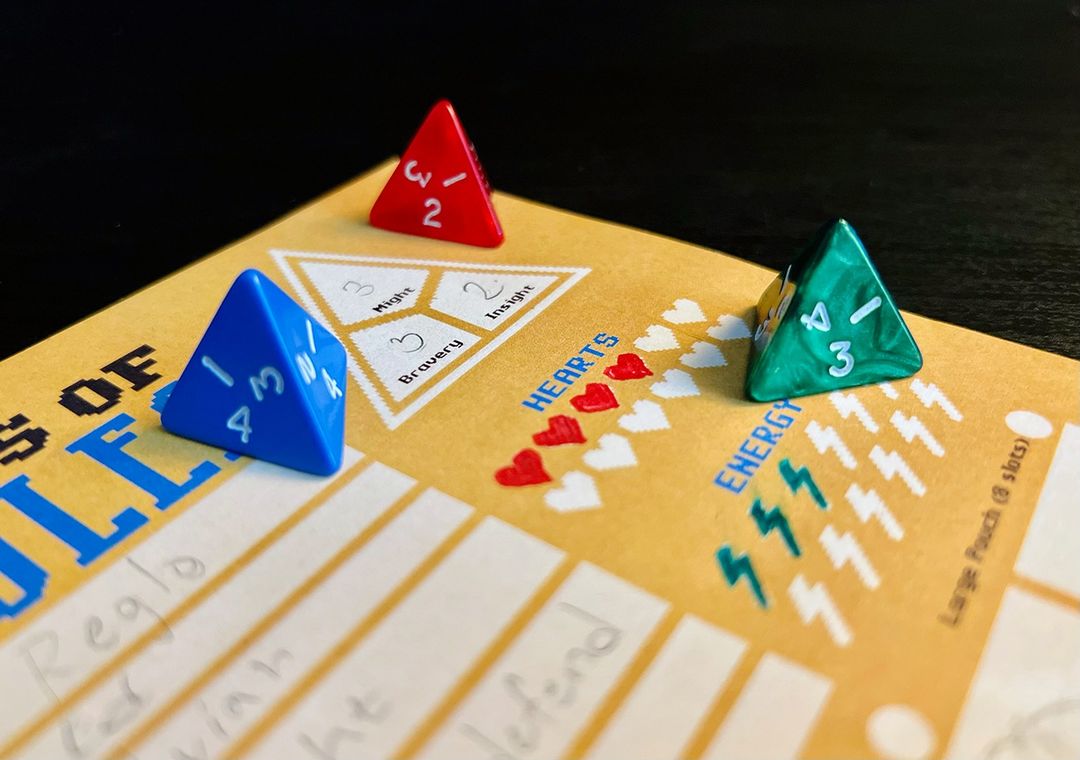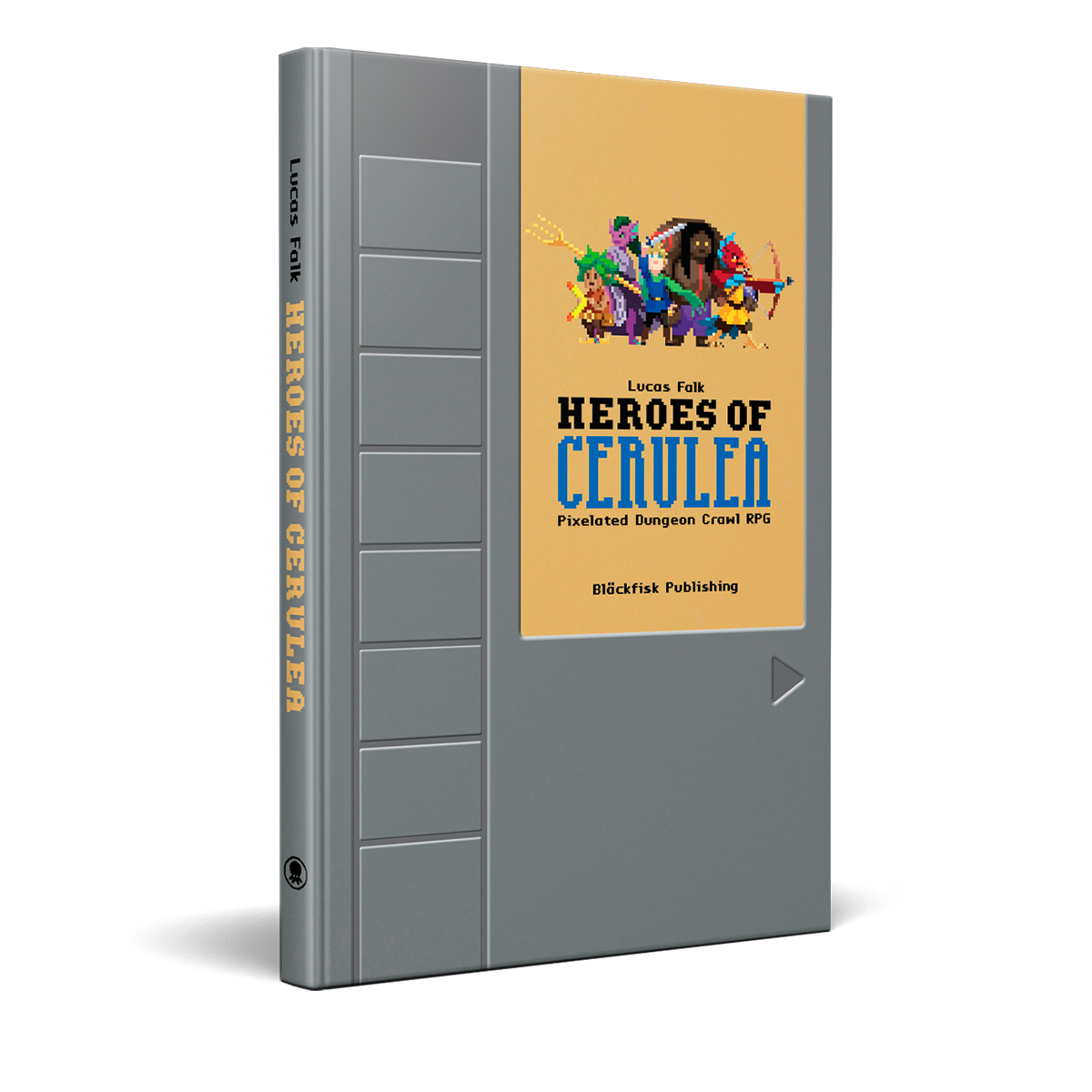The tabletop RPG space is nothing if not rife with options. There are role-playing games, big and small, for pretty much everything under the sun. It takes something special to stand out in that crowd of eager peers. It should say something then, that Heroes of Cerulea has done exactly that.
Created by Lucas Falk and Peter Malmberg of Bläckfisk Publishing, Heroes of Cerulea aims to combine the community experience of tabletop role-playing with the aesthetics and mechanics of the 8-Bit Nintendo adventures that gamers (like yours truly) grew up on in the late 1980s and early 1990s. With less than a week to go in its crowdfunding campaign, Heroes of Cerulea has earned nearly $25,000 on Kickstarter, well above its original goal of $6,702. Lucas Falk was kind enough to chat with me about the project and Bläckfisk Publishing.

Stew Shearer: Talk to me about Heroes of Cerulea! How did this project start and come together?
Lucas Falk: It started out as sort of a challenge for myself. I’m a big fan of the The Legend of Zelda games, and there are a couple of fan made tabletop RPGs—but I just didn’t feel like they captured what I personally wanted out of a Zelda tabletop RPG. So I started to explore what MY take on it would be.
I wanted to focus on dungeons, items, and puzzles, with very minimalistic rules. And once I started to lean into the video game aspects, everything just clicked. I think the game was designed in a day or two, we play tested it right away, and had lots of fun playing it. After that, it’s mostly been a matter of polishing the details to enhance the video game vibes even more.
SS: What is your favorite Zelda game?
LF: I’d have a really hard time picking a favorite Zelda game—I enjoy different things about the different instalments. But my Top 3, in no particular order, would probably be Ocarina of Time, Link to the Past, and Breath of the Wild.
SS: If you had to isolate the core mechanical selling point of the game, what would it be?
LF: The core resolution mechanic is very minimalistic, and it’s going for a fast real-time like feel. Only players make action rolls, and the player’s roll determine the outcome for both their character and for their opponent. It ends up feeling more in line with the Zelda video games than with traditional tactical turn-based combat.
Another core aspect is the video game logic. While most tabletop RPG worlds are aiming to be realistic, in this game you can use a key to unlock any door and the key disappears after you use it once, you can heal through eating a snack, if you fall down a pit you take damage but then you automatically return to where you fell from. It doesn’t make sense in the real world, but in a video game it makes total sense—and that allows for a pretty peculiar role-playing experience.
SS: I'd love to hear a bit about the origins of Bläckfisk Publishing? What's your story?
LF: Peter and I met through a Discord server for Swedish tabletop RPG podcasters, where there was a channel for discussing game design. We helped each other out with our respective games, and we had very similar ambitions. At some point we just figured it would make more sense to join forces. I have a background in layout and graphic design, Peter has a background in business and finances, and working together allows us both to focus on our strengths.
We design our games individually up until the point we feel our game is “done”. Then the other person edits the game text thoroughly, questions a lot of the design choices, enhances the game’s concept, and helps turn the game into a product. It’s great to have a partner in this endeavor, and all my ideas have been vastly improved through our collaboration.
SS: The response on Kickstarter and in the TTRPG space has been impressive. Were you anticipating this warm of a reception?
LF: When I design games, I pretty much design them just for myself. You never know if anyone else is going to have any interest in them—especially when it comes to quirky games like this one. So when people are vibing with something you’ve created, it’s very heartwarming and a bit surreal.
One of the best parts of getting a lot of support is that it allows us to do cool stuff. The book will be of higher quality, we’re now making custom dice, and we get to recruit external collaborators to make awesome stuff for the game. So yeah, we’re really grateful for all the support we’ve gotten thus far.
SS: The response to your Heroes of Cerulea, to me, confirms what a lot of gamers already knew. There is a ton of affection and nostalgia for the adventures and games of the 8-bit era. Why do you think this era of video games still looms so large in people's minds, even decades later?
LF: They had so many limitations back then, so they really had to consider why each part was worth its space, in order to make the most of it. And I think many of the games hold up pretty well even to this day—in many ways thanks to those limitations and considerations. For me, it’s the same thing with tabletop RPGs. I generally find short one page dungeons to be more inspiring and worthwhile than the massive campaign books. Limitations force you to kill your darlings, and focus on what’s really important.
SS: Any plans for what comes next after Heroes of Cerulea?
LF: We’re releasing a third party license for Heroes of Cerulea, which will allow anyone to create content for the game and distribute or sell it without our involvement. So I’m really excited to see what fun stuff people will come up with! And there are nebulous plans to maybe make an anthology book with more dungeons and Overworld locations for the game.
Besides Cerulea, we’re currently working on two other role-playing games. The first is a vibrant and optimistic action adventure game called Windsoul, set in a very atypical and non-European fantasy world. The other is a beginner friendly dungeon crawl game called Crypt Quest, mainly developed for helping parents, librarians, and youth center workers run games with pre-teens.


